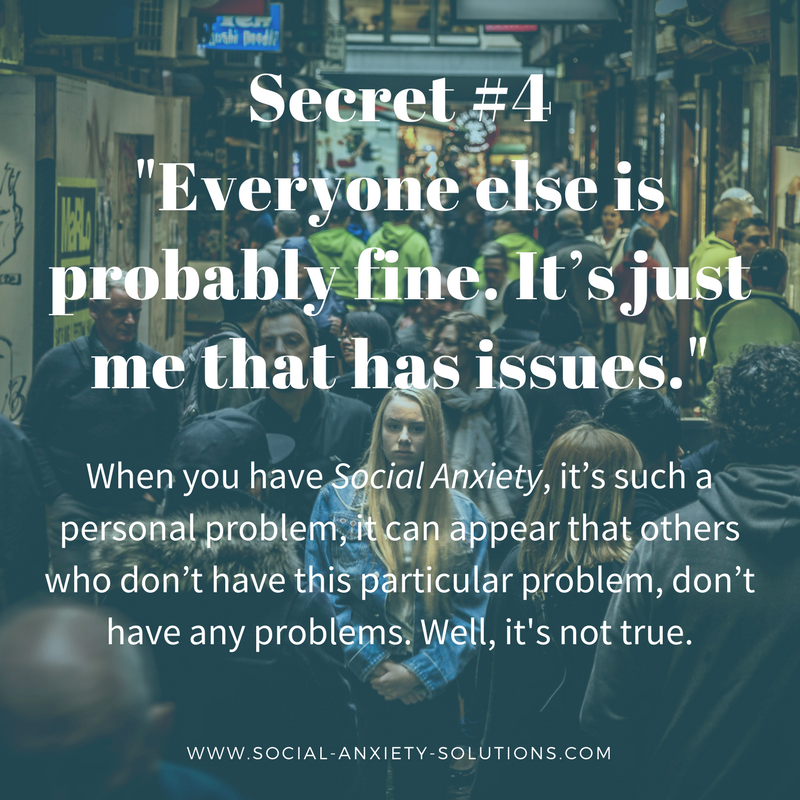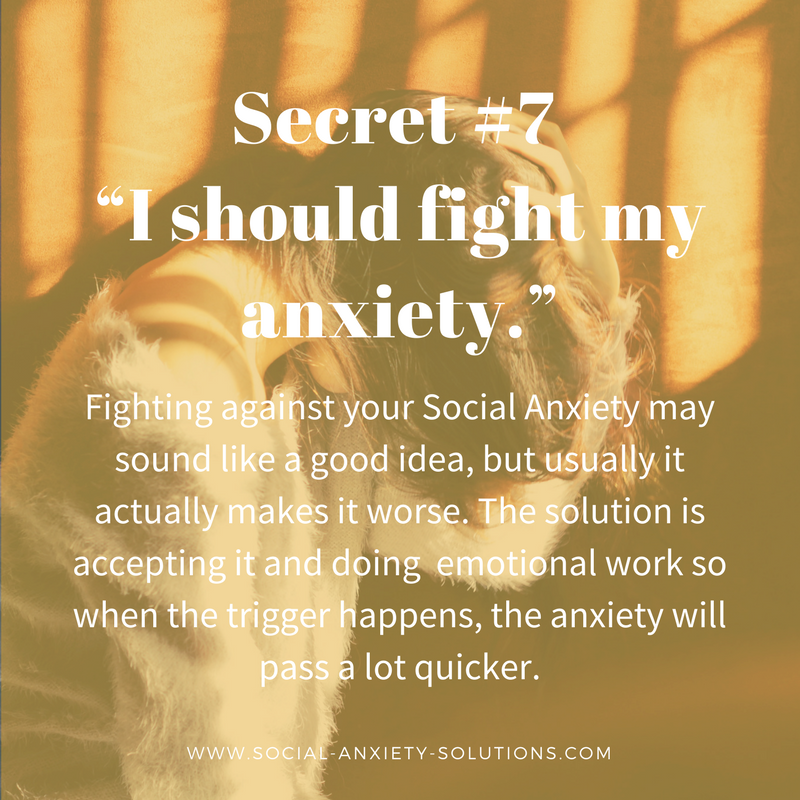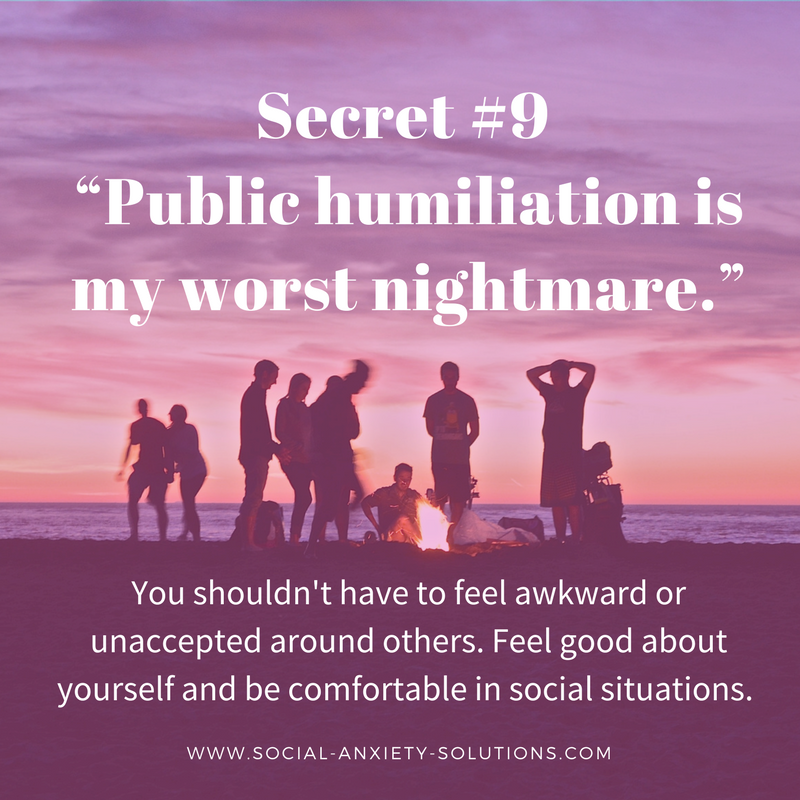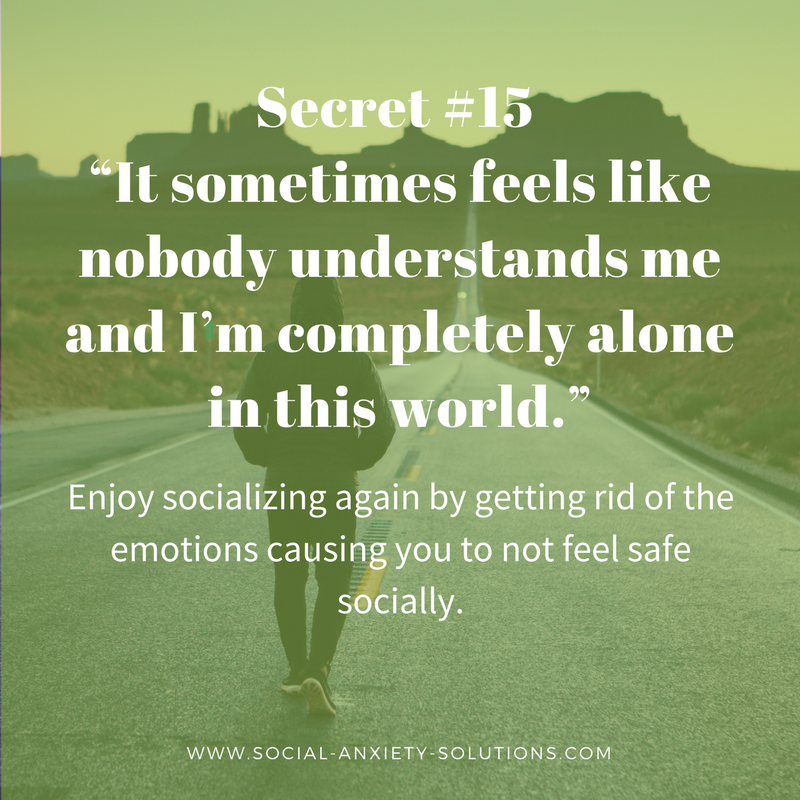SUMMARY
In this post, I share the 15 thoughts and feelings that I had when I experienced social anxiety. These thoughts and feelings are the same thoughts my socially anxious clients suffer from also.
We tend to think our thoughts are unique…
… but what we think is most personal is actually universal!
Hearing this will help you see you’re not alone in this.
I’ll provide perspective, and share what you can do to get out of this misery.




FULL TRANSCRIPTION
Hi. My name is Sebastian van der Schrier and I’m an ex-social anxiety disorder sufferer. And I’m also a social confidence coach and I specialize in helping people go from social anxiety to social confidence, so that you freely express yourself, be in the moment, connect with people, and create a satisfying social life.
Now, in this video, I’m going to share 15 of the thoughts and feelings that I had when I experienced social anxiety. I experienced social anxiety for over a decade. And these thoughts and feelings are also thoughts that my socially anxious clients suffer from, so they’re very common.
And people tend to think that the thoughts and the feelings that they’re having are pretty unique, but what’s most personal is actually most universal. So the aim of this video is actually to see how well you can relate to these common thoughts that people with social anxiety have.
And I think that if you hear and see these thoughts and you see, “Hey, I can relate to this,” that will bring a sense of relief and it’s like, “Hey, I’m not alone in this.”
So I’m going to go over these 15, and then afterwards, I’ll briefly talk about what I did to overcome my social anxiety, which isn’t your typical change your thoughts, face your fears approach. So let’s go in.
# 1: “My social anxiety is my biggest secret. I’m ashamed of it and I feel less than you because of it.”
Now, the problem with social anxiety is that in society, especially western society, it’s something that’s kind of looked down upon, like it’s some kind of a weakness.
And it’s like, “Oh, get your act together.” And so when you have this problem and you’re then ashamed of it, it actually locks the problem in place because now you don’t just have anxiety to deal with, which is difficult in and of itself. Now you also have shame about it and you judge yourself for it.
You call yourself a loser and you’re like, “Well, that person, look at him. Look how free he is. I wish I could be like him. Now that he’s in the room, I feel inferior because he’s just much better than me.”
This whole comparison game that we play in society anyway. And now that gets blown out of proportion because you have this anxiety and you feel ashamed of it.
# 2: “I feel like I’m trapped and I cannot escape this. It’s consuming my thinking. It’s always ‘there.’”
So this is something really difficult that a lot of people that don’t have this problem can’t really relate to very well. Social anxiety, it’s something that obsesses you completely, or at least that’s how it was for me.
I would wake up and I would be thinking about “Oh, who am I going to run into today that I don’t want to run into?” and “What if I’m going to get anxious and they’re going to see it?” and “What if I’m not comfortable in that situation?” and “How do I overcome this?” and “Why is this happening to me?” and “What solutions can I apply?” and blah blah blah.
And it’s like constantly in the back of your mind. It’s something that’s terrorizing your thoughts all the time. And that just makes it really hard and really difficult.
# 3: “I worry about becoming anxious and other people seeing it.”
Now, this is probably one of the most common things I hear my clients say. “I’m going to this party and what if I become anxious and others see me becoming anxious?”
And then I ask, “Okay, so what’s so bad about that?” “Well, then they judge me to be a loser and now I’m forever this kind of person in their mind.” Because it’s our biggest secret, we of course try to hide it.
But then when other people see it and we notice that they see us anxious, that actually makes us even more anxious and even more ashamed. And it’s just this negative loop that just keeps going and going and going.
# 4: “Everyone else is probably fine and doesn’t have issues. It’s just me that has issues.”
Now, this is quite an irrational thought that I see people have, including myself. But over the years of going through lots of therapy and techniques and strategies and so on, I can assure you everyone has issues. And not just a bit. Everyone has quite some issues.
Everyone has their own stuff that they’re going through. But it’s just when you have social anxiety, it’s such a personal problem that affects you, whatever interaction that you have, that it can appear that other people don’t have this particular problem, so then they probably don’t have any problems, or if they have problems, it’s probably not that bad.
Well, that’s not really true. Some people have other horrible problems that don’t particularly have anxiety problems. But other people have issues, in short.
# 5: “I often don’t know why I feel anxious. It just happens.”
Often, people are overcome by anxiety. Sometimes, and I hear this quite often, it’s like “Yeah. I don’t know when it’s going to happen. Sometimes I can predict. Oh, I know for sure. I’m going to go have this meeting. I know that I’m going to be anxious.
I’m going to be around this and that person. I know for sure I’m going to be anxious. But sometimes it just happens, and then all of a sudden, it takes me over and my heart is racing, and I have this lump inside my throat, and my mind is blanking out, and I’m trying to look for ways to escape the situation, and I feel sweaty and I’m starting to blush.” All these social anxiety symptoms that they’re describing, right? And it’s like “I don’t know why it is happening.”
Well, I can quickly tell you why it is happening. It is because in that moment, your brain is perceiving a threat and your body reacts to that threat by firing off its built-in response to that threat: the fight, flight, freeze response. And that is a response that puts your body into survival mode.
Adrenaline gets released into your body. Cortisol, your stress hormone, is released into your body. Blood goes away from your head and away from your digestive system into your outer limbs, and your whole system is being prepared to deal with that threat that your brain is perceiving. So the why is because there is a perception of a threat.
And then the survival mode that your whole system is putting is actually what we label as anxiety. So that’s a bit of an insight as to not just why it happens, but also how it is that you can get rid of anxiety, because once you get rid of the perception of the threat, you can get rid of the anxiety. Why is there a threat in the first place?
Well, you’re not really born with that. You learn that. And it’s not something you can just quickly change with your thoughts. You actually need an emotional approach. I’ll get into that after we go through these steps. So let’s move on to the next one.
# 6: “My logic cannot stop me from feeling anxious. I cannot reason myself out of my anxiety.”
And I kind of alluded to this just now. If you’re having a full-blown anxiety attack, just saying to yourself, “Oh, I’m alright. They’re not disapproving of me. They’re not judging me. They’re too concerned with themselves to be judging me,” or blah blah blah, all these little things that you can say to yourself, which do help a tiny little bit, it’s actually not really stopping the anxiety.
You can’t think yourself out of an anxiety attack because it’s an emotional problem. In that moment, your brain is perceiving a threat. No matter what you say to yourself, you’re going to react emotionally. It’s just like compared to all of a sudden a wild bear is walking into the room.
Your body is going to respond to that wild bear like mad. And you can say to yourself, “Oh, that bear is not dangerous. I’m not in danger right now. I shouldn’t run away,” but your brain is like, “Yeah, right. You’re in danger. Get the hell out of here. Fight it?
Not such a good idea. So get the hell out of here, or freeze and play dead.” So you can’t think yourself out of it. It’s an emotional problem.
# 7: “I should fight my anxiety.”
Now, this is a common thought that actually leads to quite a problem because fighting your anxiety is like it comes up, now you have this response, and now you start fighting it. “No. I shouldn’t have this anxiety. Why is this happening to me?” and “I’m pissed off at myself,” and “I’m such a loser,” and “I blame myself for it,” and “Other people don’t have it,” and “I’ve got to repress it,” and blah blah blah.
This fighting against your anxiety, it sounds like a really good idea, right? It kind of makes sense. This comes up. I don’t want it, so I’m going to attack it. But actually, what you probably found, or at least what I found, is that it hardly ever works. In most of these situations, it actually makes it worse because now you don’t just have the anxiety. Now you’re also putting yourself down. You’re making yourself less.
You’re attacking yourself, as it were. So now you’re feeling that anxiety because there is that response to the threat, and now you’re also beating yourself up. So you’re making yourself feel even worse about yourself, which makes you feel even less safe around others, and the anxiety just gets stronger.
Of course, the solution to that is accepting it. But that’s a lot easier said than done because you can’t just say, “All right, I accept my anxiety. No problem.” That doesn’t work. Again, there’s some emotional work involved in order to get to this place where your anxiety comes up and you don’t have an additional response to it. You don’t judge yourself for it. So the anxiety comes up. There’s no shame about it.
There’s maybe a little bit of frustration about it, but not an exaggerated frustration response. You don’t judge yourself to be a loser and so on. When you’re in that state, so you’re in acceptance after that trigger happens, the anxiety will pass a lot quicker and it won’t blow out of proportion.
# 8: “I am world-class at coming up with excuses to avoid.”
So avoidance. It is a problem, but it is a very understandable problem. If you know that you’re going to go to this party, and when you’re at this party, you’re going to get super anxious and you’re going to blush and you’re going to be uncomfortable and you’re not going to have a good time, then of course, you’ll naturally not want to go there.
You’re like, “Oh, man, I could stay at home, watch a movie, have a good time, or I can go to this party where I know I’m going to be uncomfortable.” So naturally, you’re going to avoid. Now, how I would do this, my friends would call me up and say, “Hey, come out. We’re going to go to XYZ,” and I would say, “No, I’ve got soccer tomorrow and I want to be fresh for it,” or “I’m already going to this other party,” or whatever. I would come up with excuses in order to not have to deal with that.
And everyone does that. It makes sense. It’s not the best thing to do. The best thing is to actually go to the experiences that you can kind of handle and then use various tools to regulate your emotions so that you can more comfortably experience that and still live your life and use these emotional tools that I’ll get into in a bit, so that you can still live your life and start reducing that perception of threat bit by bit, step by step, so that you can get rid of the anxiety.
# 9: “Public humiliation is my worst nightmare.”
This is one of the things that made it so difficult for me to go “Face your fears. Just do the things that you’re afraid of,” because I was so afraid of looking awkward or looking uncomfortable, and then it was just humiliating to me. Or someone pointing out a flaw that I had while being the center of attention, it would make me blush. Someone challenging me, it would make me blush.
All of these things that I saw as people disrespecting me or people not approving of me or people not accepting me, it would make me feel so awkward inside. It would make me feel so bad about myself. And now I had evidence, at least to myself, that they didn’t like me. And that was just humiliation. That was what I wanted to avoid the most. That was the biggest pain that I was trying to get away from in social situations. That was the thing. That was the threat, or at least one of the biggest threats that I had (because I had a lot) that would cause me to feel anxious.
So I would go to a situation, maybe with a couple of friends, group of friends or something, and I would start feeling anxious because there was the threat that maybe they will challenge me or make fun of me or ridicule me or criticize me or attack me or whatever the case may be. And it was that humiliation that I experienced so often earlier on in life and that shame of myself that I was afraid of happening again.
# 10: “I may look snobby or arrogant or disinterested, but I’m actually just afraid to connect.”
So when I moved to the Philippines when I was 24 or something, I still had quite a bit of anxiety, even though I was starting to get a handle on it. And they would call me hambugero there, which isn’t very good. It means proud and boastful American. And I’m not an American. I’m a Dutch guy. But it kind of says quite a bit about how I was coming across to these people as an arrogant guy. But it wasn’t that I was feeling superior. It was just that I felt, when I was sober… When I was drunk, no problem. But when I was sober, I just felt like if people would look me in the eyes, that they could see my insecurity, that they could see the shame that I had about myself.
And so I would rather just try to look cool and have kind of like a standoffish vibe and only let people come to me and just play this whole little game. And it would make me come across as if I was quite arrogant and disinterested in people, but I just didn’t feel safe to truly relax, look people in the eye, and connect on a person to person level because I didn’t like and love and accept and appreciate myself to the degree where I felt safe to connect with another person.
# 11: “I worry I’ll have to live with this for the rest of my life.”
So this was a very scary thought that haunted me quite a bit. I tried a whole bunch of things that didn’t work and they were supposedly the solution. Changing my thoughts, anchoring certain feeling states and making them blow up, Neurolinguistic programming, hypnosis, facing my fears.
I did all of these things and it all didn’t work. And every time I had found the next new thing and I tried it and it then didn’t work, my hope for something that would eventually help me got less and less and less, so that it was very depressing and very scary to think that.
It’s like, “Oh my god. What if I have to live with this for the rest of my life?” Very scary thought. Luckily, there are solutions which I’ll get into in just a sec. But first, we go on to…
# 12: “I have so much potential, if I could just beat this social anxiety.”
I’d like to think I’m quite an intelligent guy, I’m quite a sensitive guy, I’m quite an intuitive guy, and I could feel how other people feel quite well. I can intuit pretty accurately what people are thinking.
And I just feel I have a lot of potential. I’ve got a lot in me. There’s a lot that I want to accomplish. There’s a lot that I want to do, a lot I want to give, a lot of people I want to help. And I’ve had that for a long time, but when I was trapped in this social anxiety, there wasn’t much that I could do because I’m like, “Oh, I want to do this. Yeah, but then I’m going to get anxious.” “Oh, I want to do public speaking. Yeah, but that’s not going to be happening. How can I be an anxious public speaker trying to help people with anxiety? That doesn’t work.” And that’s a very common story that I hear from my clients.
It’s actually often why people reach out to me. It’s like, “Well, I’ve been having this job and I’ve been doing quite all right there, but now they’re promoting me. And I don’t want to take that promotion because now I have to lead a team,” or “It’s going to involve me having to do meetings. And I really want to do that, but I’m going to get so anxious that it’s going to be so stressful. I won’t be able to deal with that kind of stress.” So it’s holding you back from living your potential.
# 13: “We’re more sensitive than others, and we have the ability to sense what others feel and think. And this sometimes causes me to feel afraid.”
I just said that, actually. Typically. Not everyone with social anxiety, but typically, we’re more sensitive and we’re more empathic. We’re more intuitive as to how other people feel. And so often, we project this upon other people as well. So we then think that other people can see and intuit us being anxious, and that then makes us feel more uncomfortable. But what is often the case is people don’t even know.
People don’t even notice because they actually are consumed in their own world and they are not that bothered about you being uncomfortable, and it’s just us that is thinking and feeling that kind of way.
# 14: “While I wish it wasn’t true, I actually crave your respect, your acceptance, your approval, and your appreciation.”
Now, for some people, it’s just one of them that you really crave. But for some people, like for me, you crave most of them. And that is actually because it’s an emotional wound from your childhood that you’re living out now.
So we come into this world with basic human needs. You have a need for respect, acceptance, approval, love. And if you’re not getting that or it’s distorted or if it’s insufficient, then that becomes an emotional wound and you need that more as an adult.
And so these kinds of feelings, that neediness actually comes from that emotional wound. So that’s again an emotional problem which you can release with this emotional tool that I’ll tell you about after…
# 15: “It sometimes feels like nobody understands me and I’m completely alone in this world.”
I felt like that too many times to mention. And I’ve actually escaped The Netherlands (that’s one way of saying it) when I was maybe 20 or 21. And I traveled quite a bit and moved to new places and new countries, tried to start over. And in many of these situations, I felt really, really alone. I’ve had long periods where I had no friends and where I felt completely alone in the world, where I still couldn’t connect with people, where my human interaction on a day to day basis consisted of having a five-dollar massage and hopefully having a bit of conversation with the masseuse, saying hi and hello to the place where I would go eat, and just no social interaction aside from that.
I would play football with the Thais, but I didn’t speak that language and I felt very disconnected and very alone. Luckily, my coach really helped me with that. But it’s a very deeply painful experience when you’re that disconnected. But you’re actually disconnected from yourself and it is possible, luckily, to reconnect to the point where you are connected with yourself again. And from that place of connection with yourself, feeling safe to express yourself, now you connect with other people, and now you connect with other people effortlessly.
This is how things are now and how things have been for years for other clients as well. You get to enjoy socializing again. You look forward to it. It’s something that energizes you instead of drains you and something you avoid. So connection, that’s where it’s at, and it comes from feeling safe to be yourself.
Now, I remember when these thoughts and feelings were like a daily thing for me. And it was very difficult and dark. And even just talking about it kind of reminds me of what that was like. But the most difficult thing was that there was no real solution because I tried all those things that they said that would work. I tried changing my thoughts. I journaled more than any person I know. I challenged my thoughts. I wrote them down. I did NLP, anchoring, hypnosis. What else did I do?
Any kind of self-help I could get my hands on. Tony Robbins. Walking around pretending I have a cape, feeling all confident, visualizing myself confident. Facing my fears. I was told that you can get rejection-proof if you purposely get yourself rejected, so I’d go to Amsterdam, go to the city with a friend. He would point out girls and I would walk up to them and say like “Hey, you like me. Give me your number.” And guess what? I would get rejected. And I would do that over and over again. And at the end of the day, I had walked up to 20 girls or groups of girls and I got rejected over and over, and I didn’t care anymore. I’m like, “I feel confident. I don’t care.” Literally, I felt on top of the world. I’m like, “Look at me. This is it. Whoo!” And I’d go home and I’d fall back into my normal routine, and five days later, that confidence was gone. Nothing left.
Or flooding. Doing the thing that you’re afraid of most. I was most afraid of humiliating myself, so I bought the brightest red lipstick, smeared it around my lips, circled it around my eyes, and went into the city talking to people. And I would be so awkward and so uncomfortable. But after an hour, I’m like, “I don’t care about what people think. Look at me. I feel so good.” But same story. That gained confidence and this took so much out of me. I’m talking about it easily like it was a funny story, but I couldn’t sleep for days knowing that I was going to do this stuff. It was super, super scary. And then I did it and got the confidence, but a couple of days later, that confidence was gone again.
So all these solutions that were out there, they didn’t work. But I had committed myself. I’m like, “This is not a way to live my life. I want to be free of this stuff,” because the first 11 or 12 years of my life, I didn’t have any anxiety. I was like how I am now, just free. And so it was something like “I know that I can overcome this,” or “I know that this is not who I really am.”
And so anyway, eventually, I found a technique called EFT. It stands for emotional freedom techniques. And if you see it for the first time, you’ll probably laugh and think it’s nonsense and a scam because what you’re actually doing is you’re tapping on particular acupressure points on your body. It’s based on Chinese medicine, a discipline of over 5000 years old. Acupuncture. It’s like acupuncture, but instead of using needles, you tap on these acupressure points on the body. And strangely, what this does is it disconnects the emotion from whatever you’re thinking about. And why this is so effective for social anxiety is because your social anxiety, it’s not a logical problem.
You can’t think yourself out of your anxiety. It’s an emotional problem. And emotional freedom techniques, EFT, is a way to get rid of the emotions that are causing you to not feel safe socially. So these emotions can help you get rid of that threat, that perception that you’re in danger. And once you do that, and you do that in the right way, you can get to a place where you have no anxiety anymore because there is no perception of threat, and then you feel free to say whatever is on your mind, and then you feel safe to connect with others. And then from that place, you can create a social life, create connections with people, and really just enjoy yourself socially.
Now, I’m going to give that to you. Not EFT itself because it’s not my tool. I just learned about it. I found it, but I’ve been working with it for the past eight years. I coached socially anxious clients, specifically only socially anxious clients to social confidence. And I’ve been doing that for the past eight years. I’ve logged about 5000 coaching sessions. And I want to give this technique to you. And I have a free video series for you where I teach the basics of this technique as well as guide you through an experience of it, because just hearing about it won’t do anything for you.
This is something that you want to experience. It sounds weird, but just give it a try. You’ve got nothing to lose. So it’s called my Social Anxiety Starter Kit, Social Confidence Starter Kit. And you can get that at social-anxiety-solutions.com/bonus. And with that, you also get an eBook where I talk about my story, how I overcame my social anxiety, and why it is that you can get to a place that you’re actually anxiety-free. So you can get that. Click on the link below the video or visit the URL or whatever you do. And also leave your comment in the comment section below and we’ll see what is most popular.
So I hope this was helpful. I hope that you could relate to this. And know there are powerful solutions out there to become anxiety-free and feel calm and confident in social situations. Bye for now.
If you experience Social Anxiety, click below to receive the FREE “7 Secrets to Social Confidence” Mini Course!
- How To Stop Worrying - January 17, 2024
- How to Reduce Facial Blushing with EFT Tapping? - June 29, 2023
- Are You Scared to Get Anxious? Here’s how to fix it! - June 16, 2023


